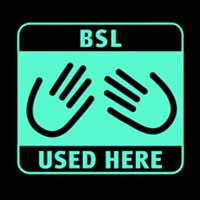British Sign Language

British sign language is as the name suggests the main form of sign language used in Great Britain. It is not the only form, as some people choose to use American Sign Language and others, and there are also forms of signed English which are used, these are not languages in their own right but more translations of English. British Sign Language (BSL) is, however, a language in its own right.
Estimates for the number of ‘speakers’ of BSL vary, but it is known to be the preferred method of communication for the majority of the deaf population in the UK which varies between 70,000 and 250,000. It’s likely that the number of BSL speakers falls into the lower half of the range, but it is still quite a considerable population who speak this language.
Set Up of British Sign Language
Many people who are new to British Sign Language make the mistake of assuming the language is a series of gestures which act out the word. This is not the case, as this would be far too complicated and time consuming, not to mention some words being nigh on impossible to act out. In fact, BSL is much more involved and is a language just as English, French and Spanish are languages. It has its own grammar system and its own rules and exceptions. It has its own vocabulary and patterns. The only thing which differentiates BSL from other languages is that it is not spoken. Apart from that it is a language as any other. It does not yet have the same status in this country as Gaelic Welsh and other languages, but campaigners want it given this status because of the numbers of people who ‘speak’ it.Uses
BSL is obviously mostly used for deaf people. Deaf people have to be able to learn it without having heard the English translations, so this is another reason why the language completely exists on its own, meaning people who are deaf from birth can understand it. As well as deaf people, the families of deaf people often learn BSL so they can all communicate together.In addition, teachers also sometimes use it so they can communicate with everyone and also teach bits to their pupils in order that they can do this too. Outside of community units such as these, BSL is often seen in everyday life, most notably on TV. All major TV channels broadcast some of their programmes with a BSL interpreter signing in a corner and with the advent of digital TV it is becoming easier for deaf people to access these. It is preferable to simply watching with subtitles because BSL can convey the emotions of a speaker’s voice in the way that subtitles never could.
British Sign Language, like any language, is a useful skill to know. It may not make you quite as attractive to an employer as if you had French or Spanish skills but what it will do, is ensure that you can chat to people you meet if they use BSL. Otherwise, if you meet a deaf person, it can be very frustrating for both of you if you do not speak the same language. Learning BSL takes time and patience but the rewards are endless, and the thrill of communicating words, emotions and feelings through your hands is great.
- Dogs and Sign Language
- How Sign Language Choirs Work
- How Do Brains Process Sign Language?
- Qualifications in Sign Language
- Learn to Sign Week
- Using Sign Language from Birth
- Who Can Benefit from Sign Language?
- Using Sign Language in Schools
- How to Start Teaching Signed Language
- The Linguistics of Sign Language
- Makaton
- Sign Supported English
- Interpreting
- Uses of Sign Language
- Worldwide Signing Information
- Home Signs
- Left Hand Signing
- Academic Advantages of Sign Language
- History of Sign Language
- Where to Learn Sign Language


Re: The Importance of Establishing Home Alerts For Deaf People
Kak esehiko sminor k112 signedlanguage.co.uk
Re: The Listening Bus
Hi, We would like to book the listening bus for our school community. What is your availability for the summer term 2025? What are the costs? We…
Re: Sign Supported English
Ex Mary hare school. Love sign supported English as Aspie. More useful Less emotional As words Not emotion More helpful to deaf Aspies
Re: The Listening Bus
Hi, I am the inclusion leader and SENCo of a school with a specialist resource provision for deaf pupils within a mainstream school. Staff say…
Re: The British Sign Language Broadcasting Trust
I’m not effected in any way or suffer from any communication issues personally. I was curious as to why…
Re: Sign Supported English
I want a series of videos to learn SIGN SUPPORTED ENGLISH FOR BEGINNERS. Can you please help?
Re: Makaton
Hello We are a small pre-school and we are trying to teach all our children Makaton to help all of them communicate regardless of their own…
Re: Sign Supported English
Can anyone help me ? I am trying to find an SSE class or lessons in Kent and have had no luck. Failing that, are there any publications I…
Re: Hands on Signing
Hi I have a blind child and he has a moderate hearing loss. I wonder if you can help me to teach him sign language and I need to learn as well.…
Re: Sign Supported English
Does anyone know of any programmes or resources for using SSE with older people whose hearing has deteriorated in later life?